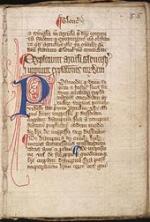(29) No constable may compel a knight to pay money for castle-guard if the knight is willing to undertake the guard in person, or with reasonable excuse to supply some other fit man to do it. A knight taken or sent on military service shall be excused from castle-guard for the period of this service.
(30) No sheriff, royal official, or other person shall take horses or carts for transport from any free man, without his consent.
(31) Neither we nor any royal official will take wood for our castle, or for any other purpose, without the consent of the owner.
(32) We will not keep the lands of people convicted of felony in our hand for longer than a year and a day, after which they shall be returned to the lords of the `fees’ concerned. (33) All fish-weirs shall be removed from the Thames, the Medway, and throughout the whole of England, except on the sea coast.
(34) The writ called precipe shall not in future be issued to anyone in respect of any holding of land, if a free man could thereby be deprived of the right of trial in his own lord’s court.
(35) There shall be standard measures of wine, ale, and corn (the London quarter), throughout the kingdom. There shall also be a standard width of dyed cloth, russett, and haberject, namely two ells within the selvedges. Weights are to be standardised similarly.
(36) In future nothing shall be paid or accepted for the issue of a writ of inquisition of life or limbs. It shall be given gratis, and not refused.
(37) If a man holds land of the Crown by `fee-farm’, `socage’, or `burgage’, and also holds land of someone else for knight’s service, we will not have guardianship of his heir, nor of the land that belongs to the other person’s `fee’, by virtue of the `fee-farm’, `socage’, or `burgage’, unless the `fee-farm’ owes knight’s service. We will not have the guardianship of a man’s heir, or of land that he holds of someone else, by reason of any small property that he may hold of the Crown for a service of knives, arrows, or the like.
(38) In future no official shall place a man on trial upon his own unsupported statement, without producing credible witnesses to the truth of it.
(39) No free man shall be seized or imprisoned, or stripped of his rights or possessions, or outlawed or exiled, or deprived of his standing in any other way, nor will we proceed with force against him, or send others to do so, except by the lawful judgement of his equals or by the law of the land.
(40) To no one will we sell, to no one deny or delay right or justice.
(41) All merchants may enter or leave England unharmed and without fear, and may stay or travel within it, by land or water, for purposes of trade, free from all illegal exactions, in accordance with ancient and lawful customs. This, however, does not apply in time of war to merchants from a country that is at war with us. Any such merchants found in our country at the outbreak of war shall be detained without injury to their persons or property, until we or our chief justice have discovered how our own merchants are being treated in the country at war with us. If our own merchants are safe they shall be safe too.




